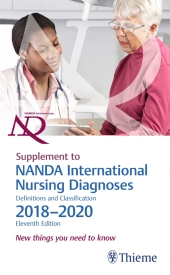 Neuerscheinungen 2019Stand: 2020-02-01 |
Schnellsuche
ISBN/Stichwort/Autor
|
Herderstraße 10
10625 Berlin
Tel.: 030 315 714 16
Fax 030 315 714 14
info@buchspektrum.de |

T. Heather Herdman, Shigemi Kamitsuru
(Beteiligte)
Supplement to NANDA International Nursing Diagnoses: Definitions and Classification, 2018-2020
New things you need to know
11th Edition. 2019. 88 S. 52 Abb. 127 x 203 mm
Verlag/Jahr: THIEME, STUTTGART 2019
ISBN: 1-68420-205-1 (1684202051)
Neue ISBN: 978-1-68420-205-8 (9781684202058)
Preis und Lieferzeit: Bitte klicken
NANDA-I supplement provides in-depth insights on current and upcoming nursing diagnoses
This supplement to the NANDA International Nursing Diagnoses: Definitions and Classification, 2018-2020 (11th Edition) is a succinct, generously illustrated companion to the comprehensive textbook by T. Heather Herdman and Shigemi Kamitsuru. The 11th edition is the definitive guide on nursing diagnoses, as reviewed and approved by NANDA International (NANDA-I), the leading professional organization that develops, researches, disseminates, and refines nursing taxonomy.
This book is designed to give current users of the full text a "quick glance" into what is new in the latest edition and more in-depth information on key changes, including new diagnoses. Four chapters provide insightful commentary on changes, new categories, revisions, and taxonomy deletions; core issues that impact diagnoses; three types of clinical reasoning models: problem-focused, risk nursing diagnosis, and health promotion diagnosis; and 17 new nursing diagnoses.
Key Features
Explanation of standardized terminology changes used in nursing diagnostic indicators, including defining characteristics, related factors, and risk factors
The addition of visual flow charts enhances understanding of the essential steps required to make accurate diagnoses
Discussion of conceptual issues the authors anticipate will require additional clarification in the upcoming 12th edition, including recommendations for modification
The must-have supplement enhances understanding, supports education, and facilitates implementation of important diagnostic changes in daily practice. All practitioners, including nursing students, professional nurses, nurse educators, nurse informaticists, and nurse administrators, who utilize the primary text will benefit from reading this companion piece.


